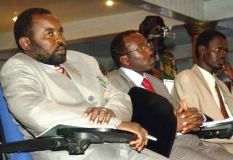Holdout Darfur rebels urged to join Darfur peace deal
May 9, 2006 (UNITED NATIONS) — Eight foreign ministers have led a U.N. Security Council meeting to demand that holdout rebel groups in Darfur join a peace deal signed last week, and warned that the fate of the Sudanese region would be a test for the powerful U.N. body.
 U.N. Secretary-General Kofi Annan warned the ministers who sat around the council’s horseshoe-shaped table not to become complacent now that the peace deal has been signed to end violence in Darfur that has killed some 200,000 people since 2003.
U.N. Secretary-General Kofi Annan warned the ministers who sat around the council’s horseshoe-shaped table not to become complacent now that the peace deal has been signed to end violence in Darfur that has killed some 200,000 people since 2003.
He told them now was “not a moment for anyone to bask in congratulations or rest on their hands. Darfur is still far from being at peace.”
He and other ministers urged other nations Tuesday to contribute more money for humanitarian aid in Darfur. A severe shortage in contributions have forced some aid groups to drastically scale back their work there.
“The plight of the people of Darfur stirs the conscience of all human beings,” U.S. Secretary of State Condoleezza Rice said. “But conscience alone will not feed starving people and save innocent lives or bring peace to troubled lands.”
Rice was among several ministers who told their colleagues of recent or new pledges to alleviate the humanitarian crisis in Darfur. The United States recently requested another $225 million for Sudan, well above what others have sought.
Several diplomats said the council’s handling of Darfur was a crucial test. Annan warned that the task that the council would soon undertake would be “one of the biggest tests this organization has ever faced,” comparable to Somalia, Rwanda and Bosnia.
“Since its inception, this Council has stood at many moments of history,” Britain’s Foreign Secretary Margaret Beckett said. “Now is such a moment. For the first time in three long hard years of war the people of Darfur have some hope.”
Earlier Tuesday, U.N. humanitarian chief Jan Egeland called on Sudan to send food to Darfur, saying Tuesday that promised international aid would not reach the region in time to stave off shortages exacerbated by the coming rainy season.
Egeland spoke to reporters in Khartoum after returning from a tour of the western region that was marred by rioting during a visit to a refugee camp. The refugees attacked a translator in Egeland’s entourage, believing he was with the feared Janjaweed militia, then killed a translator working for African Union peacekeepers.
Several diplomats pressured rebel groups to join the peace deal. The main faction of the Sudan Liberation Army had agreed to join the deal, but so far, another branch of the fractured Sudan Liberation Army has refused to do so.
“The remaining leaders of the movements – who are yet to accept the agreement – must be made aware that by hesitating they fail their own people, who most of all want to see peace and security for themselves and future generations,” said Ulla Toernaes, Denmark’s minister for development and cooperation.
Sudan’s temporary ambassador to the United Nations, Mohamed Manis, pledged that his government would not back out of the peace deal and urged the council to pressure all of Darfur’s rebels to join.
“This agreement did not come about by a quirk of coincidence, rather it has been a result of hard, strenuous and exhaustive endeavors to reconcile the parties and promote negotiations,” Manis said. “Hence, abandoning it is unthinkable as it has ended that crisis.”
Diplomats who spoke at the meeting also expressed near-unanimous support efforts to give the United Nations control over some 7,200 African Union peacekeepers in Darfur.
The African Union forces, now low on funds, have largely been ineffective in stopping atrocities and re-establishing security, leaving tens of thousands of people sheltering in camps with little food or water.
The force would be bolstered and folded into the command of a U.N. peacekeeping force monitoring a separate peace deal between Sudan’s largely Muslim north and the Christian and Animist south.
Sudan, which had previously opposed that transfer of power, has since said that last week’s peace deal had largely eradicated its objections.
Diplomats at the meeting agreed to a joint statement that welcomed the Abuja deal and urged Sudan to allow a peacekeeper assessment team into the country to prepare for the new mission.
The statement also asked Annan to consult with potential troop contributors but stressed the future U.N. force should have “strong African participation and character.”
(ST/AP)
